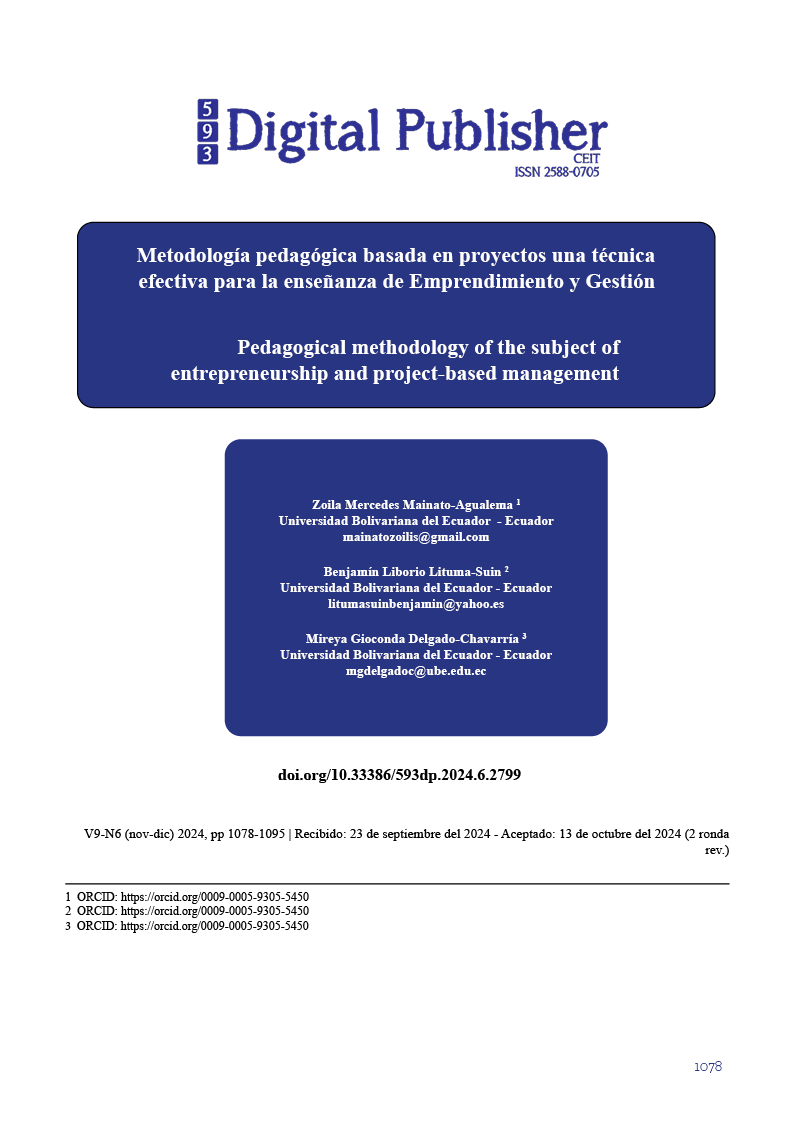Pedagogical methodology of the subject of entrepreneurship and project-based management
Main Article Content
Abstract
This research arises from the need to implement new teaching methodologies that allow improvements in learning processes; The objective of this article is to show that PBL Project-Based Learning with the application of TAC Learning and Knowledge Technologies in the subject of Entrepreneurship and Management significantly improve said process. This technique is based on a mixed approach that combines qualitative and quantitative elements to obtain a comprehensive vision of the situation, where quantitative research seeks accurate knowledge that is observable, measurable and quantifiable; Meanwhile, qualitative research seeks to understand and interpret the object of research, rather than describing them, it uses data collection without numerical measurement. To systematize the theoretical foundations, a review of relevant bibliographic sources and previous research works that addressed related topics was carried out, where it is evident that in educational units where traditional teaching is maintained, the exit profile required by the educational authorities, while when innovative methodologies are included, the results are successful, as has been evidenced with the use of PBL. The research techniques applied in this study confirm that both students and teachers consider that a better level of learning would be achieved if new strategies are included and basing the completion of the subject with a project motivates students to consider applying what they have learned in the future. in the well-being of their personal and family economies.
Downloads
Article Details

This work is licensed under a Creative Commons Attribution-NonCommercial-ShareAlike 4.0 International License.
1. Derechos de autor
Las obras que se publican en 593 Digital Publisher CEIT están sujetas a los siguientes términos:
1.1. 593 Digital Publisher CEIT, conserva los derechos patrimoniales (copyright) de las obras publicadas, favorece y permite la reutilización de las mismas bajo la licencia Licencia Creative Commons 4.0 de Reconocimiento-NoComercial-CompartirIgual 4.0, por lo cual se pueden copiar, usar, difundir, transmitir y exponer públicamente, siempre que:
1.1.a. Se cite la autoría y fuente original de su publicación (revista, editorial, URL).
1.1.b. No se usen para fines comerciales u onerosos.
1.1.c. Se mencione la existencia y especificaciones de esta licencia de uso.
References
Guerrero, A., Chiriboga, S., Godoy, A., & Silva , E. (2023). Análisis bibliométrico de las tecnologías del aprendizaje de conocimiento TAC, aplicable al desarrollo de proyectos e investigación. https://www.polodelconocimiento.com/ojs/index.php/es/article/view/6068/15309#, 8(9), 1-18. https://doi.org/10.23857/pc.v8i9.6068
Alexandra, G. (2021). Aprendizaje basado en proyectos en la enseñanza virtual, de emprendimiento y gestion en bachillerato técnico. (M. I. Maestría en Educación, Ed.) Recuperado el 15 de junio de 2024, de https://repositorio.uti.edu.ec/bitstream/123456789/2335/1/TRABAJO%20330%20-%20MEILE%207%2c%20GUEVARA%20VACA%20ALEXANDRA%20ELIZABETH.pdf
Alvarez, C. (2022). TIC...TAC: Transferencia en las aulas de Lengua y Literatura, puente entre la educación secundaria y la universidad. En C. V. Álvarez-Rosa. Salamanca (España): Ediciones Universidad de Salamanca. Recuperado el 14 de mayo de 2024, de https://revistas.um.es/educatio/article/download/575751/344681/2127161
Bellei, C. (2000). Educación media y juventud en los 90. Actualizando la vieja promesa. https://www.scielo.cl/scielo.php?script=sci_arttext&pid=S0718-22362000000100006, 8(12). https://doi.org/http://dx.doi.org/10.4067/S0718-22362000000100006
Calle, J. (febrero de 2019). Asignatura de emprendimiento y gestión en el proceso educativo. Recuperado el 12 de mayo de 2024, de UNIVERSIDAD DE GUAYAQUIL: http://repositorio.ug.edu.ec/bitstream/redug/41637/1/BFILO-PMP-19P155.pdf
Castillo, L. (2020). Universidad Tecnológica Idoamérica. Recuperado el 24 de julio de 2024, de Aprendizaje Basado en Proyectos en la Agisnatura de Emprendimieno y Gesti+on: https://repositorio.uti.edu.ec/bitstream/123456789/7002/1/Castillo%20Naula%20Maria%20Lissette.pdf
Cevallos, G., Cadena, V., & Cedeño, E. (agosto de 2018). Proyectos integradores de saberes como estrategia didáctica de aprendizaje en los Institutos Superiores Tecnológicos. Revista Cuatrimestral “Conecta Libertad”, 2(3), 24-34. https://doi.org/ISSN 2661-6904
Chiluisa, J. (2023). Educación Ecuatoriana en la actualidad. Modelos pedagógicos de enseñanza. Ciencia Latina Revista Científica Multidisciplina, 7(3), 1-14. https://doi.org/https://doi.org/10.37811/cl_rcm.v7i3.6317
Cortez, L. (septiembre de 2017). La metodología pedagógica y el aprendizaje en los estudiantes con discapacidad intelectual. Recuperado el mayo5 de 2024, de Universidad Técnica de Ambato. Dirección de Posgrado.: https://repositorio.uta.edu.ec/handle/123456789/26181
Delgado, F., & Alarcón, L. (06 de mayo de 2022). Aprendizaje basado en proyecto y su aplicación para el desarrollo de habilidades para la vida. RevistaCientífica Mundo Recursivo, 5(2), 128-148. https://doi.org/ORCID 0000-0002-9660-8154
Fernandes, A. (29 de febrero de 2021). Técnicas de investigación. Recuperado el 1 de julio de 2024, de https://www.diferenciador.com/tecnicas-de-investigacion/
Flores, R. (junio de 2022). Metodología del aprendizaje basado en proyectos (ABP). Recuperado el 12 de mayo de 2024, de Educación Secretaria de educación pública: https://educacionbasica.sep.gob.mx/wp-content/uploads/2022/06/Metodologia-ABP-Final.pdf
Granados, A., Romero, L., Rengifo, R., & Garcia, G. (2020). Tecnología en el proceso educativo: nuevos escenarios escenarios. Revista Venezolana de Gerencia, 25(92), 1809-1823, 2020. Recuperado el 29 de mayo de 2024, de https://www.redalyc.org/journal/290/29065286032/html/
Gustavo, B. (29 de octubre de 2023). El Aprendizaje Basado en Proyectos (ABP) como estrategia metodologíca en la asignatura de emprendimiento. Revista Bolrtín R E D I P E, 13(3). https://doi.org/S S N 2 2 5 6 - 1 5 3 6
Huamán , A., Treviños, L., & Medina, w. (11 de diciembre de 2021). Epistemología de las investigaciones cuantitativas y cualitativas. Horizonte de la ciencia, 12(23), 23-27. https://doi.org/https://doi.org/10.26490/uncp.horizonteciencia.2022.23.1462
Instituto Nacional de Estadísiticas y Censos. (2023). Boletín Técnico No. 02-2023-REEM. Registro estadístico de empresas 2022. Quito, Pichincha, Ecuador: Instituto Nacional de Estadísticas y Censos. Obtenido de https://www.ecuadorencifras.gob.ec/documentos/web-inec/Estadisticas_Economicas/Registro_Empresas_Establecimientos/2022/Semestre_II/Boletin_REEM_2022.pdf
Lanuza, I., Rizo , M., & Saavedra , E. (2018). Uso y aplicación de las TIC en el proceso de enseñanza-aprendizaje. Revista Científica de FAREM-Estelí., 1(25), 16-30. https://doi.org/DOI: http://dx.doi.org/10.5377/farem.v0i25.56672018
López, G., & Sánchez, L. (2010). El aburrimiento en clases. Procesos Psicológicos y Sociales, 6(1y2), 1-43. https://doi.org/SSN 1870 - 5618
López, N., & Sánchez, L. (2010). Procesos Psicológicos y Sociales, 6(1 Y 2), 1-43. https://doi.org/ISSN 1870 - 5618
Manobanda, I., Vásquez, M., García, G., & Rumiguano, M. (septiembre -octubre de 2022). Aprendizaje Basado en Proyectos como estrategia en la planificación microcurricular de docentes del bachillerato técnico. Ciencia Latina, 6(5), 169. https://doi.org/https://doi.org/10.37811/cl_rcm.v6i5.3067
Mena, L., Vera, L., & Mora, F. (marzo-abril de 2024). Integración de la Tecnología Educativa en el Aula de Educación Básica en Ecuador. Ciencia Latina Revista Cientifica Multidisiplinar, 8(2), 150-162. https://doi.org/https://doi.org/10.37811/cl_rcm.v8i2
Meza, J., Gil, L., & Morales , M. (2017). La evaluación edeucativa como proceso histórico social. Perspectiva para el mejoramiento de la calidad de los sistemas educativos. http://scielo.sld.cu/scielo.php?script=sci_arttext&pid=S2218-36202017000400022, 19(4), 162-167. https://doi.org/UNIVERSIDAD Y SOCIEDAD | Revista Científica de la Universidad de Cienfuegos | ISSN: 2218-3620
Murgueitio, M., Burbano, E., & Moreno, E. (25 de marzo de 2019). La educación e investigación formativa en la formación de emprendedores. Revista Espacios, 40(9), 5. Recuperado el 24 de junio de 2024, de https://www.revistaespacios.com/a19v40n09/a19v40n09p05.pdf
Paños, J. (12 de diciembre de 2017). Educación emprendedora y metodologías activas para su fomento. Revista Electrónica Interuniversitaria de Formación del Profesorado,, 20(3), 33-34. https://doi.org/http://dx.doi.org/10.6018/reifop.20.3.272221
Pillacela, L. I. (2018). Estrategias metodológicas para mejorar los procesos de enseñanza aprendizaje de estudios sociales. Recuperado el 5 de mayo de 2024, de Universidad Politécnica Saleciana Sede Cuenca: https://dspace.ups.edu.ec/bitstream/123456789/15169/1/UPS-CT007489.pdf
Pincay, Y., & Piñaherrera, E. (febrero de 2019). Asignatura emprendimiento y gestión en el proceso educativo. Recuperado el 14 de mayo de 2024, de UNIVERSIDAD DE GUAYAQUIL: https://repositorio.ug.edu.ec/server/api/core/bitstreams/756db269-690a-4969-8df6-6ed8f611aa55/content
Rodríguez, B. (enero-junio de 2018). Proyecto de innovación educativ. 2(3), 122-138. https://doi.org/ISSN 2602-8247
Toala, C., & Cevallos, P. (agosto de 2022). Uso de las Tic en la educación virtual del Bachillerato. Revista Educare, 26(2), 1-26. https://doi.org/https://orcid.org/0000-0002-3833-8379
UNAE. (2021). Modelo Pedagógico UNAE. Recuperado el 5 de mayo de 2024, de Educación y Género: http://repositorio.unae.edu.ec/bitstream/56000/1180/1/M_B73-73-98.pdf
Villarreal, N. A. (02 de agosto de 2023). Enfoque STEAM como metodología activa del aprendizaje en. Recuperado el 5 de mayo de 2024, de UNIVERSIDAD TÉCNICA DEL NORTE: http://repositorio.utn.edu.ec/handle/123456789/14705
Zambrano, M., Hernández, A., & Mendoza, K. (10 de febrero de 2022). El aprendizaje basado en proyectos como estrategia didáctica. CONRADO | Revista pedagógica de la Universidad de Cienfuegos, 18(84). https://doi.org/ORCID: https://orcid.org/0000-0001-5760-7143




